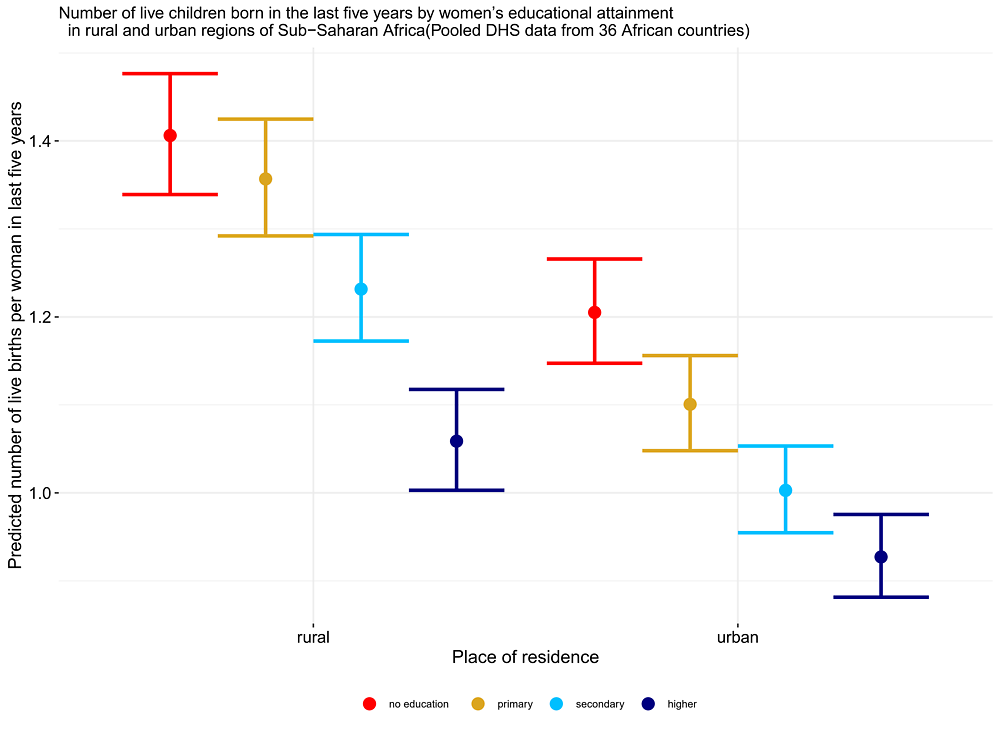Forschungsgruppe
Ungleichheiten in Verwandtschaftsbeziehungen
Auf einen Blick
Projekte
Publikationen
Team
Projekt
Understanding Educational Differentials on Fertility Intentions and Behavior
Saroja Adhikari, Wolfgang Lutz; in Zusammenarbeit mit Samir KC (International Institute for Applied System Analysis, Österreich), Endale Birhanu Kebede (MPIDR)
Ausführliche Beschreibung
Fertility plays a significant role in shaping population dynamics and societal structures. Variations in fertility levels and rates of change directly influence population size and composition. Declines in fertility can lead to population aging, high age dependency ratios, and demographic transformations, exerting considerable influence on healthcare systems, labor markets, and social welfare provisions. Thus, understanding the implications of changing fertility levels is crucial for effective resource allocation and sustainable planning. Recognizing that the future population composition of lower- and middle-income countries (LMIC) depends heavily on fertility behavior, this project looks into reproductive intentions and behaviors across diverse contexts and regions (Africa, Asia, and Latin America) in LMIC, with a particular focus on women's educational levels.
We first explore subnational variations in fertility levels across diverse geographic regions, time frames, and educational strata. Urbanization has gained increased attention as a significant source of fertility heterogeneity in recent decades. While organizations like the United Nations have started integrating urbanization into future population projections, they lack a systematic analysis of its importance as a new dimension in such projections. Notably, none of these organizations have projected future fertility rates by explicitly considering the effects of urbanization. Urban areas typically show a higher proportion of educated women, and as higher female education is linked to lower fertility rates, urbanization's impact on fertility may originate from differences in educational distributions between rural and urban regions. We systematically investigate whether urbanization's influence on fertility is driven by educational disparities between rural and urban areas and whether urbanization should be included as an additional source of heterogeneity in population projection models, alongside age, sex, and education.
Second, we investigate whether subnational variations in fertility intentions and behaviors across different education levels arise from the diffusion of lower fertility intentions and behaviors between these groups. Human behavior is profoundly shaped by social influences; therefore, we seek to understand how the educational backgrounds of peers and neighbors impact the reproductive decisions of women in Africa. By examining these social dynamics, we aim to understand the mechanisms underlying fertility heterogeneity within education levels in different communities.
This project also extends to studying social learning behavior in relation to gender preference in birth in Nepal, where the preference for a son is significantly higher than in other regions. By considering the education of neighbors as a proxy of social influence, we explore the joint impact of women’s, partner’s, and neighbors’ education on women’s gender preference in birth.
Policymakers can benefit from our findings by learning about the short- and long-term effects of educational investments on population size and distribution. The project also contributes to guiding the scientific community in refining population projection models to more precisely forecast future fertility patterns.

Bildung und Wissenschaft, Geburtenentwicklung, Projektionen und Vorhersagen